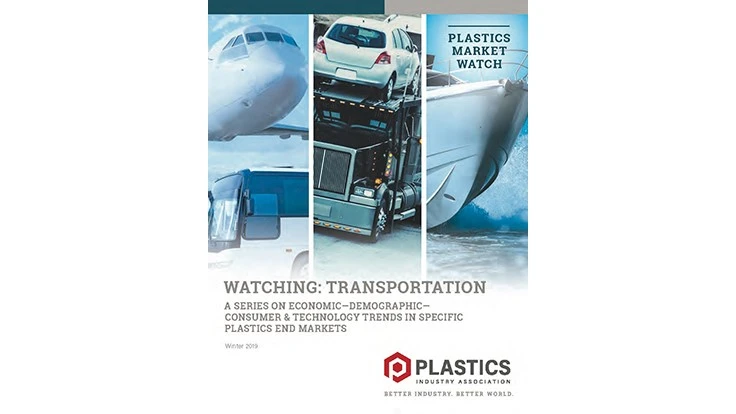
According to a new report by the Plastics Industry Association (Plastics), Washington, demand for plastics in several modes of transportation is increasing.
The Plastics Market Watch report, titled “Watching: Transportation,” looks at the recent trends in innovative transportation, including electric vehicles (EV), autonomous or self-driving vehicles and shared transportation, such as boats, trains and planes.
The report indicates experts are calling plastics one of the biggest breakthroughs in innovation since the Ford Model T, having a more significant impact on society due to its dynamic capabilities of transforming cities and disrupting the movement of goods.
“Due to current trends, we expect for plastics to become a solidified material in transportation vehicles and other technologies,” says the association's Chief Economist Perc Pineda.
“Engineers and designers use plastic for vehicle materials because of its weatherability and moisture repellence, safety advances, improved comfort and other properties, many of which are in the research and development stages,” Pineda adds. “Considering that demand for transportation is not going away anytime soon, plastics will remain a viable material in the transportation space.”
Plastics created the Transportation and Industrial Plastics (TIP) committee in 2015, following plastics’ growing role in the automotive and transportation sector.
“TIP has grown in membership and in stature to include some of the most important voices in this increasingly important sector for the plastics industry,” the association's Interim President and CEO Patty Long says. “Its contributions were vital to creating this most-recent Plastics Market Watch report, which shows the sky continues to be the limit for plastics in transportation.”
Since 1970, the use of plastics in aviation has quadrupled, which makes the airline industry a key market for plastic. Nylon will also play an important role with the electrification of vehicles because it is strong, lightweight, durable and resistance to damage. It contributes to reducing the weight of a vehicle by 50 percent.
“The flexibility of plastics in terms of performance, design, weight and costs could be an advantage as electric vehicles increase market share,” says Kendra Martin, Plastics' vice president of industry affairs and TIP manager. “Plastics currently available meet the specifications of electric motors and it will be interesting to see new polymers come forth as EV technology takes hold.”
Latest from Recycling Today
- Aqua Metals secures $1.5M loan, reports operational strides
- AF&PA urges veto of NY bill
- Aluminum Association includes recycling among 2025 policy priorities
- AISI applauds waterways spending bill
- Lux Research questions hydrogen’s transportation role
- Sonoco selling thermoformed, flexible packaging business to Toppan for $1.8B
- ReMA offers Superfund informational reports
- Hyster-Yale commits to US production





